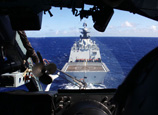
Liu Cigui, director of the SOA, said "maritime power" usually refers to a country with comprehensive strength in maritime exploitation, marine economic development, marine environmental protection and marine control.
Liu said the maritime economy is becoming a new engine for China's economic restructuring.
The government's determination to develop the marine economy has resulted in a series of efforts, including the establishment of Sansha City in July and the State Council's approval of maritime zoning plans submitted by Guangdong and Hainan provinces for the 2011-2020 period, as well as its approval of a five-year plan for maritime economic development from 2011 to 2015.
However, China's exploitation of its maritime territory is still at a relatively low level, said Luo Liang, a marine economics researcher at the National Institute for South China Sea Studies.
Data from the Hainan Provincial Fishery Research Institute indicated that the potential fish catch in waters administered by Sansha adds up to 5 million tonnes, with fishermen able to sustainably catch 2 million tonnes of fish annually.
However, the actual catch stands at just 80,000 tonnes every year. Gigantic oil and gas deposits lying under the ocean are also waiting to be explored.
The South China Sea's oil reserves are estimated to be around 23 to 30 billion tonnes, with gas reserves believed to total about 16 trillion cubic meters, according to the Ministry of Land and Resources.


















![]()
